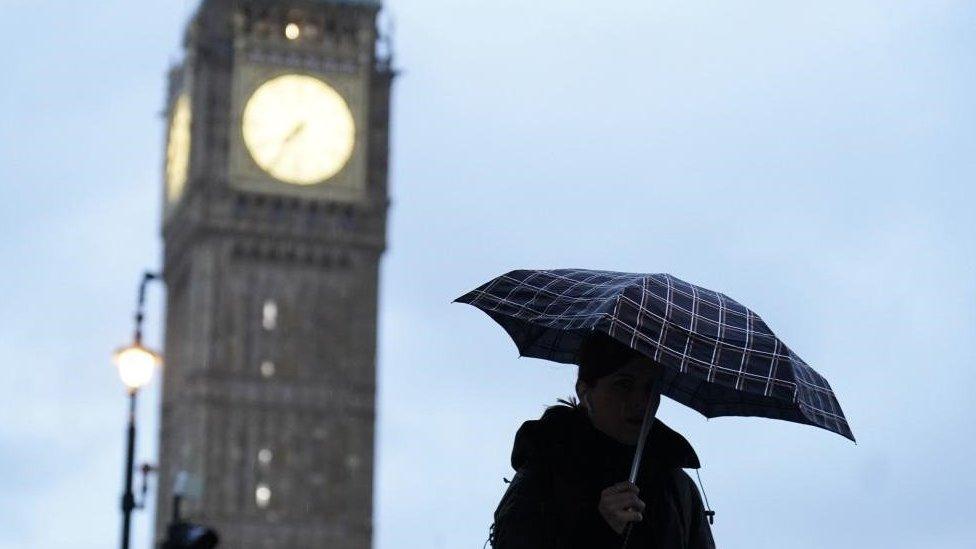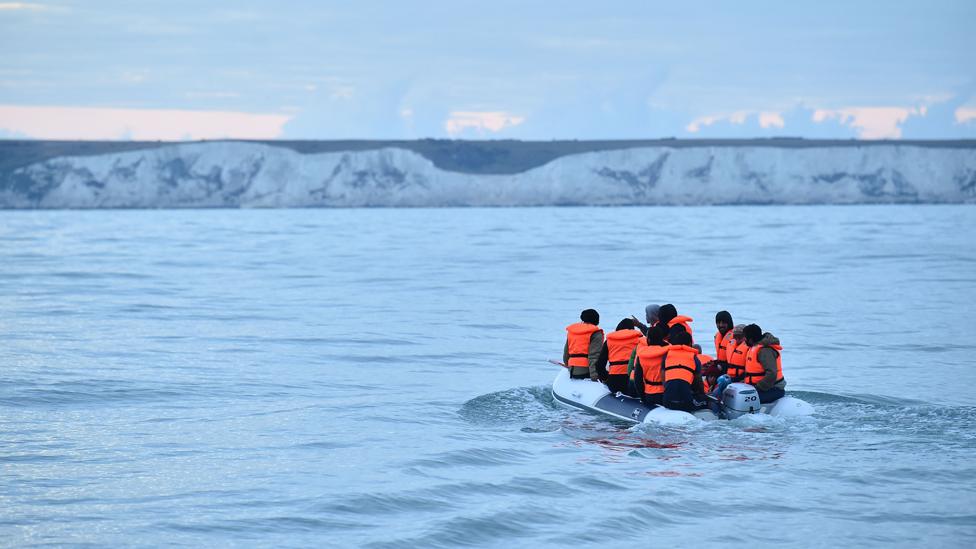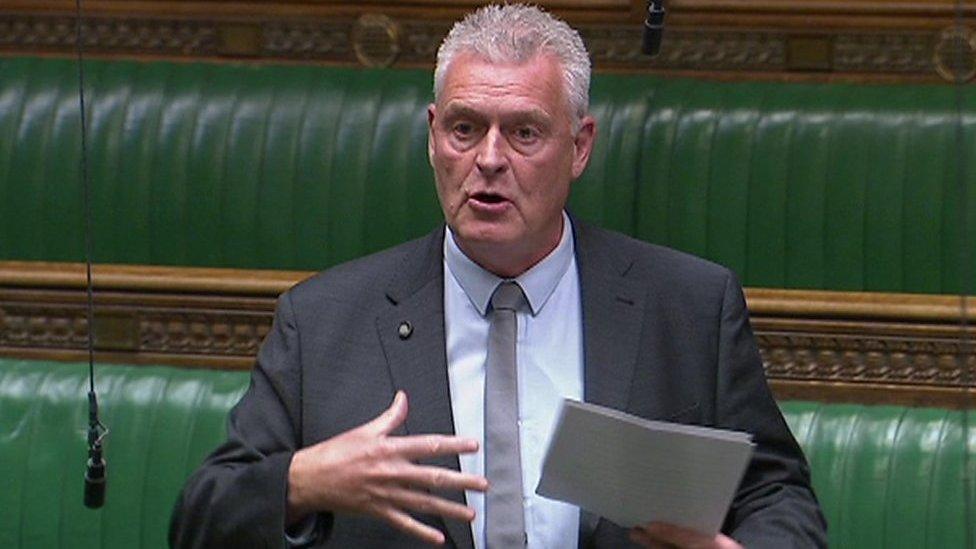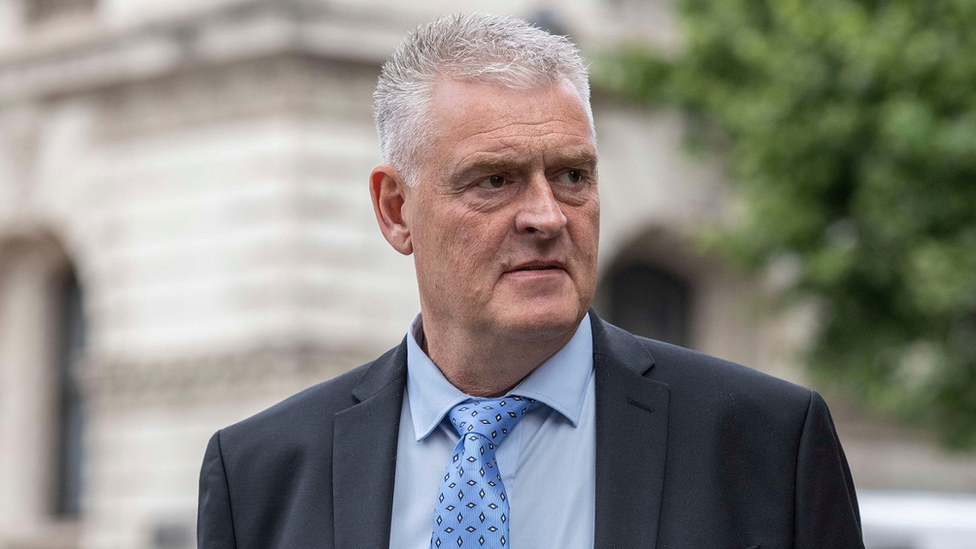What's happening in Parliament this week?
- Published

Two government priorities, the Illegal Migration Bill and Budget, go through the House of Commons next week.
Hard politics is back in the Commons this week - with a vengeance.
The week opens with the Commons initial debate on the highly controversial Illegal Migration Bill.
Then it will be dominated by the announcement of the Chancellor, Jeremy Hunt's first Budget and the ensuing debate, which extends into the first two days of the following week.
Amidst the hubbub the deadline for considering the much-revised - and still in limbo - Online Safety Bill will be extended by 18 weeks, until 20 July.
In the Lords there's an interesting sub-plot developing around the Financial Services and Markets Bill.
It is due to complete its Committee Stage on Monday. This is one of those complex technical measures debated in Grand Committee, rather than on the floor of the House.
The process has ground on to a record length.
When it moves back to the Chamber at Report Stage, look out for an amendment from the Chair of the Lords Economic Affairs Committee, Lord Bridges. He wants to create a backstop body to keep an eye on the work of the Financial Conduct Authority. The government doesn't like the idea - so watch this space.
Monday 13 March
Commons: (14:30 GMT) Defence Questions, with any urgent questions or government statements following at 15:30.
Given the Speaker's displeasure after the government announced delays to the HS2 high speed rail programme in a written ministerial answer late last Thursday, this looks a highly probable subject for a government statement or urgent question. Also, look out for another rebuke from the Chair to ministers - not that they seem to have any effect.
Main debate: Second Reading of the Illegal Migration Bill.
It is a measure of the angst around this bill that there are already no fewer than four amendments to decline a second reading, from Labour, the Lib Dems, the Labour left (plus the SDLP, Plaid's Liz Saville Roberts and the Green Party's Dr Caroline Lucas) and from the SNP.
The Speaker normally selects the official Opposition amendment.

In total, 45,755 migrants crossed the Channel last year
The government is fast-tracking the bill, with two six-hour days of detailed debate on the floor of the Commons. I assume they will follow next week.
Day one is devoted to the meat of the bill: The clauses limiting the ability to suspend deportation under the European Convention of Human Rights and capping the number of entrants to the UK under safe and legal routes.
Day two will deal with the remainder - including clauses permanently banning people from the UK if they've entered illegally.
Westminster Hall (16:30): A three hour debate on e-petition 623390, "Make suicide prevention a compulsory part of the school curriculum". This petition, which attracted 158,000 signatures, was started by the campaign group 3 Dads Walking.
Committees: Levelling Up, Housing and Communities (16:00) Committee will question witnesses from the planning, local authority, and housing sectors on reforms to national planning policy for England.
Lords: (14:30) day four of detailed scrutiny of the Levelling-Up and Regeneration Bill. The number of days of Committee consideration has been pushed up from eight to ten, to accommodate the vast list of amendments.
Tuesday 14 March
Commons: (11:30) Foreign Office Questions, followed by a Ten Minute Rule Bill from Conservative MP Paul Holmes. He wants a new planning presumption against new quarries near settlements.
Main debate: Then it is on to backbench debates. First on homelessness among Ukrainian refugees in the UK - where there are warnings that increasing numbers face homelessness or destitution. Conservative Bob Blackman leads.
The second debate is on the seizure of Russian assets. Former Conservative leader Sir Iain Duncan Smith, arguing that Russian assets held in the UK should be seized to help the Ukrainian government rebuild devastated infrastructure.
Westminster Hall: Backbench debate on extending the lease for to 150 years London Zoo to allow it greater confidence in investing in facilities. Conservative Bob Blackman leads.
Then at 16:00 Labour's Andy McDonald leads a debate on the new Middlesbrough Development Corporation. This is a highly controversial issue in the region, pitting Conservative Metro Mayor Ben Houchen against local Labour MPs and councillors. It's only half an hour but there could be considerable Red Wall crossfire.
Committees: The day's main event is the joint evidence session held by the Business Energy and Industrial Strategy and the Justice committees starts at 10:15. MPs are investigating forced installation of expensive pre-payment meters in the homes of energy customers. They're combining to question British Gas owner Centrica, energy company Utilita, debt enforcement agencies and a former magistrate about the legal and commercial aspects of the forced installations.
Lords: (14:30) Peers respond to Commons amendments to the Public Order Bill and the UK Infrastructure Bank Bill, before looking at the detail of the Trade (Australia and New Zealand) Bill.
Wednesday 15 March
Commons: (11:30) It is the debut question session for the new Science Innovation and Technology Department, followed, at Noon, by Prime Minister's Question Time.
Main debate: The Chancellor Jeremy Hunt presents his budget, triggering four days of debate on whatever it contains.
Westminster Hall: Labour's Kevan Jones, who has talked about his own mental health issues leads a debate on the Mental Health and Wellbeing Plan (11:00). Conservative Peter Bone leads a debate on human trafficking and modern slavery (14:30).
Committees: Environmental Audit (14:15) quizzes Energy Security and Net Zero Secretary Grant Shapps. On the agenda is energy efficiency, strategy on solar and renewable energy, and plans for how the UK's offshore oil and gas sector will meet emissions reduction targets.
Lords: Day five on the detail of the Levelling-Up Bill, plus a short debate on how the Barnett Formula distributes taxpayer's money around the nations and regions of the UK.
Thursday 16 March
Commons: (09:30) Cabinet Office Questions, which may be more than usually lively, given the Sue Gray saga. This is followed by the weekly update on the forthcoming Commons agenda, from the Leader of the House.
Main debate: Continuation of the Budget debate - it extends until Tuesday 21 March.
Westminster Hall: First, there is a debate on relations with China during the presidency of Xi Jinping (13:30). The DUP's Jim Shannon wants to highlight the Uyghur genocide in Xinjiang and the threats to Taiwan. Second is a debate on car parking for care workers (15:00). The Conservative Damien Moore want to propose free car parking passes for carers on duty, making home visits
Lords: Peers have their debate on the Budget.
Friday 17 March
Commons: It is another day devoted to laws proposed by individual MPs. The first four bills are all on the final straight, having emerged unscathed from scrutiny in committee. They now face Report Stage - where any MP can propose changes - and Third Reading.
First up is the Conservative Henry Smith's Hunting Trophies (Import Prohibition) Bill.
The Child Support (Enforcement) Bill aims to improve the recovery of arrears from parents who to pay child maintenance. It is proposed by the Conservative Siobhan Baillie, a family law solicitor.
The Powers of Attorney Bill, by Conservative Stephen Metcalfe, wants to the process of making and registering a lasting power of attorney to be safer and easier.
Then it is the Animals (Low Welfare Activities Abroad) Bill. Conservative MP Angela Richardson wants to ban the sale and the advertisement in England, Wales and Northern Ireland of low-welfare animal activities, like elephant rides, dolphinariums and close encounters with big cats.
With detailed debate on four different bills, there probably won't be much time available for the Second Reading of the Palestine Statehood (Recognition) Bill, from the Lib Dem Layla Moran, still less the Chalk Streams (Protection) Bill from her colleague Sarah Green.
Lords: Not sitting.
Related topics
- Published24 January 2023

- Published11 May 2022

- Published11 March 2024

